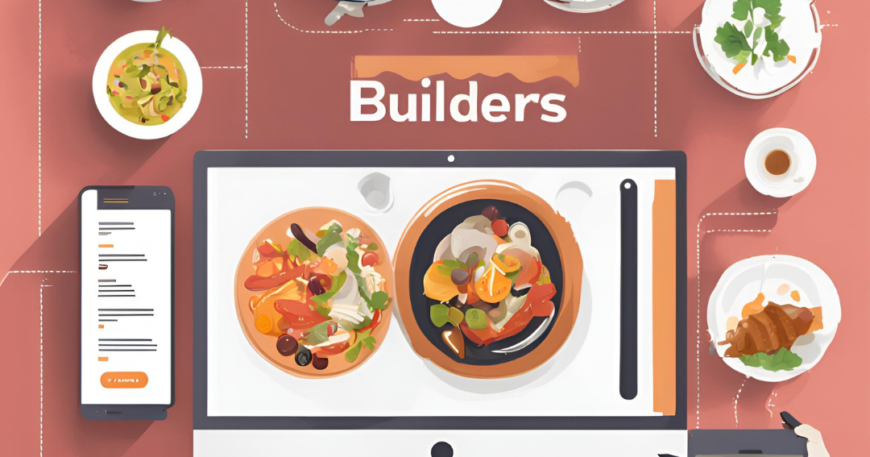In the digital age, having a stellar online presence is crucial for any restaurant. It’s more than just listing your address and hours of operation—it’s about creating an engaging experience that reflects your brand and attracts customers. With the best restaurant website builders of 2024, you can easily craft a professional and functional website without breaking the bank or needing a computer science degree. Let’s dive into the best options available this year.
Criteria for Choosing a Restaurant Website Builder
Ease of Use: Not everyone has a technical background, so a good website builder should be user-friendly and intuitive. Drag-and-drop functionality, pre-designed templates, and a simple interface are essential.
Design Flexibility: A restaurant’s website should reflect its unique brand. Look for builders that offer customizable templates, various design options, and flexibility to match your aesthetic vision.
Mobile Responsiveness: With many users browsing on their phones, a website that looks and works well on mobile devices is crucial. Ensure the builder you choose offers responsive designs.
SEO Capabilities: Search Engine Optimization (SEO) helps your restaurant appear in search results when potential customers look for dining options. Effective SEO tools and features are a must-have.
Integration with Restaurant Management Tools: The ability to integrate reservation systems, online ordering, and menu management tools directly into your website can streamline operations and enhance the user experience.
Pricing: Website builders vary widely in cost. Consider your budget and look for a solution that provides value for money while meeting your needs.
Top Restaurant Website Builders for 2024
Here’s a quick overview of the top restaurant website builders, followed by detailed insights into each:
| Website Builder | Ease of Use | Design Flexibility | Mobile Responsiveness | SEO Features | Integrations | Starting Price |
|---|---|---|---|---|---|---|
| Wix | 5/5 | 5/5 | 5/5 | 4/5 | 4/5 | $16/month |
| Squarespace | 4/5 | 5/5 | 5/5 | 5/5 | 4/5 | $23/month |
| WordPress+Elementor | 4/5 | 5/5 | 5/5 | 5/5 | 5/5 | $5/month (hosting) |
| Shopify | 5/5 | 4/5 | 5/5 | 4/5 | 5/5 | $39/month |
| GoDaddy | 5/5 | 3/5 | 5/5 | 3/5 | 4/5 | $11/month |
| Weebly | 5/5 | 4/5 | 5/5 | 4/5 | 4/5 | $10/month |
| Duda | 4/5 | 5/5 | 5/5 | 4/5 | 4/5 | $14/month |
| GloriaFood | 5/5 | 3/5 | 5/5 | 4/5 | 5/5 | Free |
| Zoho Sites | 4/5 | 4/5 | 5/5 | 4/5 | 3/5 | $6/month |
Wix
Features:
Wix offers a plethora of templates specifically designed for restaurants, from simple cafes to fine dining establishments. It provides a robust drag-and-drop editor, allowing you to easily customize your site. Wix also supports online ordering, reservation systems, and menu management.
Pros and Cons:
- Pros: Highly customizable, extensive app marketplace, excellent design flexibility.
- Cons: Can become expensive with premium apps, the interface might feel overwhelming at first.
Ideal for: Restaurants looking for high customization and a wide range of functionalities.
Squarespace
Features:
Squarespace is known for its stunning design and aesthetic appeal. It provides beautifully crafted templates that are mobile responsive and optimized for performance. It also offers integrations with OpenTable for reservations and ChowNow for online ordering.
Pros and Cons:
- Pros: Sleek designs, excellent customer support, strong SEO tools.
- Cons: Slightly higher cost, fewer third-party app integrations compared to competitors.
Ideal for: Restaurants focusing on a visually impressive online presence.
WordPress with Elementor
Features:
WordPress combined with Elementor gives unparalleled flexibility. You can start with any WordPress theme and use Elementor’s drag-and-drop builder to create a custom restaurant website. Plugins like WP Restaurant Manager and WooCommerce can be added for online ordering and reservations.
Pros and Cons:
- Pros: Extremely flexible, thousands of plugins, great for SEO.
- Cons: Requires more setup and maintenance, can be complex for beginners.
Ideal for: Users needing complete control and advanced features.
Shopify
Features:
While primarily known for e-commerce, Shopify also serves restaurants well, especially those offering merchandise or pre-packaged meals. It supports powerful sales tools, inventory management, and marketing integrations.
Pros and Cons:
- Pros: Excellent for selling products, comprehensive sales tools, easy to use.
- Cons: Higher price point, some limitations on design flexibility.
Ideal for: Restaurants with a focus on selling products or gift cards online.
GoDaddy
Features:
GoDaddy’s Website Builder offers easy-to-use tools for creating a simple restaurant website. It includes marketing and SEO tools, and you can quickly set up online reservations and menus.
Pros and Cons:
- Pros: Very user-friendly, affordable, integrates with other GoDaddy services.
- Cons: Limited design flexibility, fewer features than competitors.
Ideal for: Small restaurants needing a straightforward, low-cost solution.
Weebly by Square
Features:
Weebly, now part of Square, provides an intuitive drag-and-drop builder with a focus on simplicity. It integrates seamlessly with Square’s payment and online ordering tools, making it ideal for restaurants.
Pros and Cons:
- Pros: Simple to use, affordable, good for integrating with Square.
- Cons: Less design flexibility, limited advanced features.
Ideal for: Restaurants looking for a simple site with easy online ordering.
Duda
Features:
Duda offers a comprehensive website builder with advanced design features and a focus on mobile-first design. It includes various restaurant templates and integration options for reservations and online ordering.
Pros and Cons:
- Pros: Excellent design tools, mobile-responsive, good SEO features.
- Cons: Can be pricey, less known than major competitors.
Ideal for: Restaurants prioritizing mobile design and detailed customization.
GloriaFood
Features:
GloriaFood is tailored specifically for restaurants and offers a free platform with features like online ordering, table reservations, and menu management. It’s a niche solution with excellent specialized tools.
Pros and Cons:
- Pros: Free to use, excellent restaurant-specific features.
- Cons: Limited design options, relies on third-party hosting.
Ideal for: Restaurants seeking a cost-effective, specialized solution for online ordering.
Zoho Sites
Features:
Zoho Sites provides a user-friendly website builder with essential features for restaurants, including online reservations and menu management. It integrates well with Zoho’s suite of business tools.
Pros and Cons:
- Pros: Affordable, integrates with Zoho’s business tools, easy to use.
- Cons: Limited design flexibility, fewer restaurant-specific features.
Ideal for: Restaurants already using Zoho’s business tools or seeking a budget-friendly option.
How to Choose the Best Builder for Your Restaurant
Assess Your Needs: Consider what features are essential for your restaurant. Do you need online ordering, reservation systems, or just a simple informational site?
Consider Your Budget: Match your needs with what you’re willing to spend. Remember that some builders offer free plans or trials.
Evaluate Support and Community: Look for platforms with good customer support and active communities where you can seek help and advice.
Conclusion
Choosing the right website builder can make a significant difference in how your restaurant is perceived online and how efficiently you manage your digital presence. Each builder listed has its strengths, so consider your specific needs and budget to make the best choice. Whether you prioritize ease of use, design flexibility, or advanced features, there’s a perfect builder out there for you.
FAQs
1. What should I consider when choosing a restaurant website builder?
Consider factors like ease of use, design flexibility, mobile responsiveness, SEO capabilities, integration with restaurant tools, and pricing.
2. Can I build a restaurant website for free?
Yes, some builders like GloriaFood offer free options, but they may come with limitations on features or require third-party hosting.
3. How important is SEO for a restaurant website?
SEO is crucial as it helps your restaurant appear in search results, driving more traffic and potential customers to your site.
4. Do I need technical skills to use these website builders?
Most website builders are designed to be user-friendly, requiring minimal technical skills. However, some, like WordPress, might need more setup and maintenance.
5. Can I integrate online ordering with my restaurant website?
Yes, many website builders offer integrations for online ordering, either through built-in features or third-party apps.





